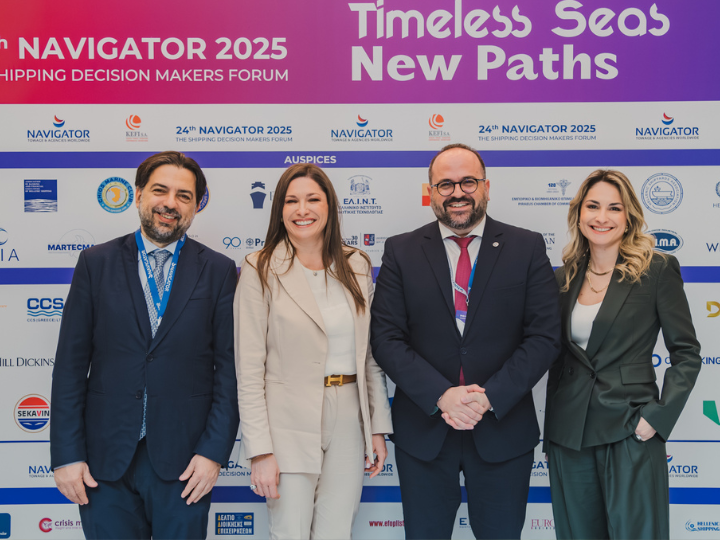The event brought together over 300 executives from the maritime industry, representing 165 ship-owning companies and maritime service providers. Distinguished representatives such as the ambassador of the UK and Luxembourg were among our prestige guests, including embassy representatives from the United States, China, Japan, Italy, Lithuania, Hungary and Portugal.
For one more year, 30 maritime organizations, associations and leading educational institutions alongside Manolis Koutoulakis, the Secretary General of the Aegean and Island Policy ministry, and George Alexandratos, the President of the Hellenic Chamber of Shipping, discussed the current main challenges the maritime sector is facing.
The future of the maritime industry will be shaped by a combination of factors, including decarbonization, human resources, technological advancements, regulatory frameworks, and geopolitical developments. Geopolitical uncertainty, technological transformation, and innovation will play pivotal roles in driving a sustainable and competitive maritime future.
Geopolitical developments, such as ongoing conflicts, new trade policies, and targeted sanctions, significantly impact global shipping by reshaping commercial routes and influencing transportation costs. Strengthening maritime security, diversifying supply chains, and developing new trade corridors—such as the Indo-Middle East-European Corridor (IMEC)—will be crucial in addressing these challenges. Moreover, China’s dominance in shipbuilding and port operations continues to influence the global trade balance, underscoring the interconnectedness of the maritime industry.
Shipping, with its long history of self-regulation and adaptation, is well-positioned to meet the growing demand for decarbonization. However, the subjectivity of decarbonization and the ongoing uncertainty regarding future bunker types create challenges for the industry. Additionally, the tax-like nature of various regulatory decarbonization frameworks remains a point of contention.
The Environmental, Social, and Governance (ESG) reporting framework will increasingly affect shipping companies, particularly as regulations evolve under the European Sustainability Reporting Standards (ESRS). While smaller shipping companies may benefit from simpler reporting frameworks, the International Maritime Organization (IMO) remains the primary driver of ESG-related changes, though no significant shifts in their agenda for shipping have occurred yet.
Attracting young talent and offering clear career paths will become increasingly vital. The new generation of workers brings different expectations about work-life balance, which may create a generational gap. While digital communication enables seafarers to stay connected with loved ones, it also contributes to increased isolation among crew members, further highlighting the need to address these concerns. Comprehensive education, lifelong training, stakeholder collaboration, and strategic planning will be essential to ensure a resilient, efficient, and sustainable maritime sector.
The future seafarer will require specialized skills to operate vessels with increasing automation and the use of alternative fuels. Technology, particularly digital transformation, will continue to reshape the maritime sector. Both shipping companies and technology providers agree on the importance of ensuring safe operations and bolstering cybersecurity, with Artificial Intelligence (AI) playing a key role in enhancing productivity.
However, challenges such as “digital fatigue,” the need for a shift in management mindset, data standardization, and the demand for more practical solutions from technology providers remain. To maximize efficiency, automation and AI will be crucial, but regulators must establish clear timelines and roadmaps to guide the transition.
Finally, while new digital technologies hold immense potential for the future of shipping, addressing the generational gap, ensuring the well-being of seafarers, and overcoming technological hurdles will be essential to creating a sustainable and thriving maritime industry.
In a rapidly evolving world, the shipping industry is navigating unprecedented technological, geopolitical, and environmental challenges. The path forward lies in fostering collaboration among stakeholders, embracing innovation, and keeping the human element at the heart of all we do. Danae Bezantakou, CEO of NAVIGATOR SHIPPING CONSULTANTS, emphasized that the NAVIGATOR ASSEMBLY 2025 reaffirmed the company’s unwavering commitment to shaping a sustainable, resilient, and future-ready maritime ecosystem.
The success of NAVIGATOR ASSEMBLY 2025 highlights NAVIGATOR SHIPPING CONSULTANTS’ dedication to fostering synergies, dialogue, and innovation within the maritime industry. The key takeaways will be further explored at the 24th NAVIGATOR 2025 – THE SHIPPING DECISION MAKERS FORUM, scheduled for Tuesday, November 11, 2025, at the Lighthouse of the Stavros Niarchos Foundation Cultural Center.
Sponsors: A GENERAL GROUP, AKEREON, ANTIPOLLUTION, AUSTRIACARD HOLDINGS, BENEFIT, CCS, COLUMBIA GROUP, CMA ARGOUDELIS, CROSSWORLD, CYGNUS, DEEPSEA TECHNOLOGIES, DIAPLOUS, DNV, DYNAMIC GROUP, EMBASSY OF PANAMA, ERNST & YOUNG, FORTUNE TECHNOLOGIES, FRANMAN, FURUNO, GOLDEN CARGO, HILL DICKINSON, INMARTEK, KPMG, LG MAR, MARICHEM MARIGASES, MOORE, NAFTOSOL, NEREUS, OCEANKING, ORIANI, PALAU INTERNATIONAL SHIP REGISTRY, PPG, POLYGREEN, SEKAVIN, SHIPMONEY, SYNTHETICA, THE AMERICAN P&I CLUB, THE MARSHALL ISLANDS REGISTRY, TIMAGENIS LAW, TOTOTHEO MARITIME, UK P&I, VSHIPS, WARTSILA.




 By: N. Peter Kramer
By: N. Peter Kramer

